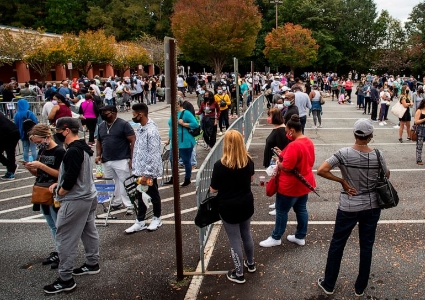Polling

Suggest an important issue not listed in this sub-category (). (Maximum 60 Characters)
Voter suppression

In 2013, our Supreme Court invalidated the preclearance provision of the 1965 Voting Rights Act which protected eligible voters from discriminatory voting laws, saying there is no longer a need for the protections of this provision. Proving the Court wrong, states immediately began passing restrictive voter laws that had been judged illegal before the Court’s ruling. At least 20 states have passed new voting laws that restrict the registration of voters, the time available to cast a ballot, and the type of identification needed to do so. These laws and policies have made it significantly more difficult for students, minorities, elderly citizens and those with disabilities to exercise their most basic constitutional right. The governors and legislators of these states claim these laws were passed to prevent voter fraud and protect election integrity.
But extensive studies have proven that voter fraud does not exist. That is, unless one considers 31 fraudulent votes out of the one billion ballots cast between 2000 and 2005 to be enough justification for voter suppression laws that deny many millions the vote. Critics claim the purpose of these laws is to suppress and discourage democrats and minorities from voting. Minorities typically wait about twice as long to vote as their peers, and sometimes much longer. Advocates say generations of Americans have fought and died for our right to vote, the freedom to choose our leaders and the right to speak up for our beliefs. They claim these undemocratic voter suppression laws are an anathema to our Founding Father’s legacy, saying our efforts should be spent helping Americans vote, not obstructing those who are eligible from doing so.
Proposed Legislation: H.R.4 - Voting Rights Advancement Act of 2019
Prospective Sponsor: Rep. Terri A. Sewell (AL)
But extensive studies have proven that voter fraud does not exist. That is, unless one considers 31 fraudulent votes out of the one billion ballots cast between 2000 and 2005 to be enough justification for voter suppression laws that deny many millions the vote. Critics claim the purpose of these laws is to suppress and discourage democrats and minorities from voting. Minorities typically wait about twice as long to vote as their peers, and sometimes much longer. Advocates say generations of Americans have fought and died for our right to vote, the freedom to choose our leaders and the right to speak up for our beliefs. They claim these undemocratic voter suppression laws are an anathema to our Founding Father’s legacy, saying our efforts should be spent helping Americans vote, not obstructing those who are eligible from doing so.
Proposed Legislation: H.R.4 - Voting Rights Advancement Act of 2019
Prospective Sponsor: Rep. Terri A. Sewell (AL)
Poll Opening Date
June 7, 2021
Poll Closing Date
June 13, 2021
Democracy Rules respects the privacy of your information.
See PRIVACY STATEMENT
See PRIVACY STATEMENT